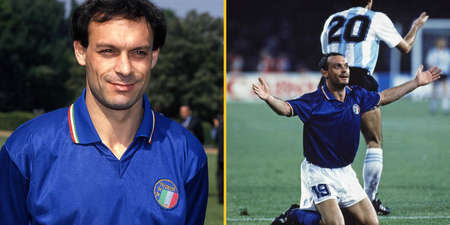We don’t have the patience to run the numbers and come up with an answer to the question of whether or not a cross-field diagonal ball actually works.
All we know is that we’ve spent hours of our childhood trying to recreate the pass that we’ve seen Paul Scholes, Steven Gerrard and Xavi ping across a pitch.
But Opta analyst Colm McMullan is not too sure on the effectiveness of the pass in the overall scheme of a football match.
He examined the effect of these passes and whether or not they should continue to be employed by managers.
To do so, he looked at the amount of the passes attempted from the above position (and its mirror image, i.e from right to left) in the top 5 European leagues in the last two seasons.
McMullan found the success rate of these passes seemed to hover at around 40% in all leagues.
Premier League – 41% successful out of 3459 attempted
Bundesliga – 42% of 2790
Ligue 1 – 38% of 2683
La Liga – 40% of 2940
Serie A – 39% of 2140
Less than half of a success rate is not the worst percentage when it comes to football but his research reveals more.
For the curious among you, he also researched the teams who have used this type of pass more often, as well as which teams are the most successful at the technique.
In terms of teams who have employed the diagonal ball the most, we have, in order …
-
Evian Thonon Gaillard
-
Stoke City (shocker)
-
Newcastle
-
Augsburg
-
Real Sociedad (Moyes will be thrilled)
These clubs might be pinging long balls all day long but, when McMullan looked at the success rate of these passes he found that only 5 clubs out of the 112 analysed had a success rate of over 50%, they were …
-
Juventus
-
Bayern Munich
-
Barcelona
-
Stoke City
-
Real Madrid
In terms of players’ prevalence of using the technique, the top five are …
-
Inigo Martinez – Real Sociedad
-
Jagielka – Everton
-
Krul – Newcastle
-
Penneteau – Valenciennes
-
Dawson – Tottenham Hotspur
And the most successful are …
-
Sahin – Dortmund
-
Xavi – Barcelona
-
Benaglio – VFL Wolfsburg
-
Cigarini – Atalanta
-
Benalouane – Atalanta
The top 5 players in terms of reception of these diagonals will surprise few.
-
Crouch – Stoke
-
Benteke – Aston Villa
-
Lambert – Southampton
-
Muller – Bayer Munich
-
Hahn – FC Augsburg
Now, about Steven Gerrard.
If you look up cross-field diagonal in the dictionary, you’re likely to see a photograph of the Liverpool captain.
His name is intrinsically linked to the technique but the overall success of it is questionable.
McMullan found that Gerrard found his target with 37 out of 59 of these passes (63% and not bad at all).
McMullan’s main area of analysis was how successful these passes are in terms of chance creation, i.e how often do they lead to a positive phase of play.
He found that, in Gerrard’s case, the 59 attempted diagonals led to no goals, 8 shots on target and 3 shots off target which would suggest that the play is not all that effective when you look at the stats.
But it’s not just Gerrard (who we know uses this technique well when contrasted with most others) who fails to create an abundance of chances using cross-field diagonal balls.
As established above, when we look at the basic element of a pass reaching an attacker, this type of play is roughly 40% successful, but how successful is it in terms of leading to a clear cut scoring chance? McMullan found that of the 14,002 events (cross-field diagonals) in the 2,855 matches examined, once the ball reached its intended target it resulted in only 17 goals and 159 shots on target.
When you look at the above graphic, which takes into account the complete possession phase after the ball reaches the attacker, be it one pass or a series of 20 passes, you can see how very ineffective the cross-field diagonal pass is as it leads to a whopping 85% of negative events and just 15% of positive events.
When the phase of play is continued, the initial forward cross-field pass led to such a low percentage of chance creation (0.2% goals and 4.7% shots on target) that it makes you wonder whether or not it is the best tactical system for a manager to put into place, unless you’ve got Peter Crouch in your team of course.




























